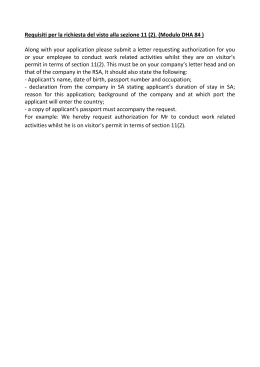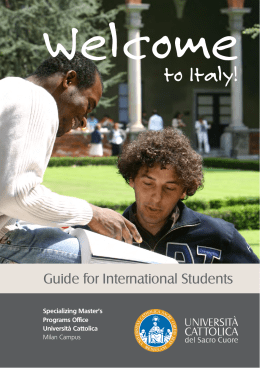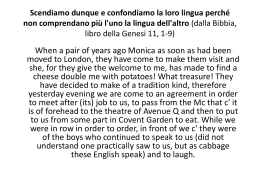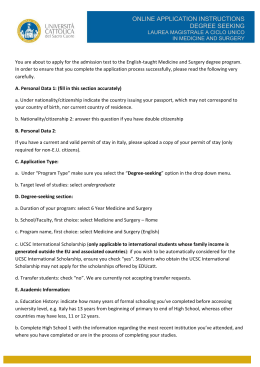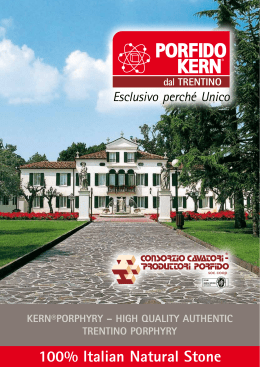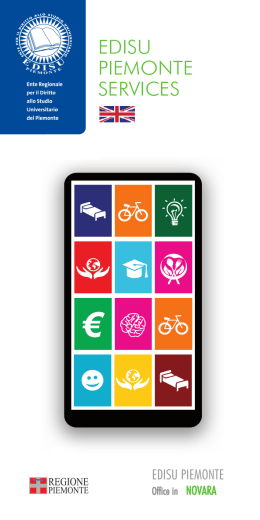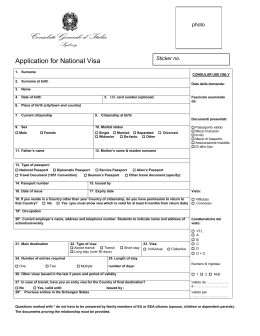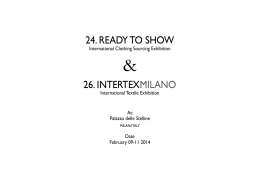N. 9 - 7.02.2007 Family Reunions 1. The new provisions to request family reunion. th The Gazzetta Ufficiale has published decree-law number 5 of January 8 2007 modifying the conditions and procedures for the request of a family reunion, which are now more favorable than they were prior to this amendment. Since the decree provides for additional provisions, it will be necessary to follow the outcoming instructions from the Ministry of the Interior and from the Ministry of the Foreign Affairs to present the application according to the new procedure we are about to examine. We will obviously keep you updated. Focusing on this matter, we will just outline the procedures regarding the citizens of Non-EU member states. In our next editions we will discuss the reunion of citizens of Non-EU member states with Italian citizens and with citizens of EU member states, and we will discuss the permesso di soggiorno for family purposes. Let’s start with the definition of family reunion, which is the right enjoyed by the foreign national residing in Italy to petition for his/her family members who reside abroad, with the aim of restoring the unity of the family in a continous matter. Non all foreign nationals qualify for that right but only those who are holders of one of the following authorizations: - the carta di soggiorno or EC long-term residence permit, which in a short time will replace the carta di soggiorno; - a permesso di soggiorno, valid for not less than one year, issued for subordinate work, for self-employed labourers, for political asylum, for study, for religious or family purposes. Secondly, this right cannot be exercise on behalf of any family member, but only on behalf of the following family members: - the spouse. Since Italy does not recognize poligamy, a family reunion can be requested on behalf of only one spouse; - minor children under age 18 , even if they are only children of the spouse or if they were born out of wedlock, unmarried , provided that the other www.immigrazioneoggi.it N. 9 - 7.02.2007 parent, gives his/her consent. Adopted children, children and minors in custody have the same rights. It is sufficient that the children are minors at the time the application is filed; - children over the age of majority who are dependant and disable; - parents who are dependant on the applicant (but not on the spouse) and who don’t have a sufficient family support in their country of origin. Having clarified who can apply for a family reunion and who are the the family members who are eligible to enter Italy to reunite, we will now discuss the requirements and procedures to be followed. Fundamental requirements are income and housing. Income must be proportional to the number of family members on behalf of whom an applicant is requesting a family reunion, specifically: - if you are petitioning for only one family member, the annual gross income must not be less than 5.061,68 euro; - if you are petitioning for two or three family members, the annual gross income must not be less than 10.123,36 euro; - if you are petitioning for four or more family members, the annual gross income must not be less than 15.185,04 euro; A particular special-term applies in the case of a petition on behalf of children who are under the age of 14. In this case, whatever the number of the children, an annual income not less than 10.123,36 euro will be sufficient to qualify. The following is another special-term to be remembered : in order to determine the income, the total annual income of all family members living with the applicant will be taken under consideration: these can be either the spouse, the child, the parent , etc. Housing must follow the minimal standards provided for by the regional law for public residential housing. To prove this requirement, the applicant must present a statement issued by the competent city hall office. In alternative, the applicant may present the certificate of hygiene-sanitary suitability issued by the local Health Office. The foreign national who does not own housing but is a co-habitant, for instance of his employer, must present the written consent by the owner of his housing. In case the application concerns a dependant child who is under the age of 14, he/she will only need the consent of the owner of housing where the minor will actually reside. The request for reunion must be submitted through the mail to the sportello unico della prefettura for immigration located in the area of residence, upon completion of the required forms which can be downloaded from the website www.interno.it in the section “Sportello unico”. www.immigrazioneoggi.it N. 9 - 7.02.2007 The sportello unico, upon receiving the request, will call the applicant who must then present the certificates concerning income and suitability of housing. The sportello unico will issue a receipt and a copy of the documents presented. With the new procedures, on the contrary of what has happened until this time, all certificates regarding family relations (birth, marriage, child ) or the relation of the dependant family, must not be submitted to the Sportello Unico, but directly to the Italian embassy or consulate which will then issue the entry visa. After having obtained a nulla osta from the Sportello Unico, the applicant for family reunion must forward the nulla osta to the family member residing abroad, who must then apply for the entry visa at the Italian embassy or consulate submitting the nulla osta in addition to the documents proving the status of relative, spouse, minor age or disability. The issuance of a receipt from the sportello unico at the time the application is presented is very important. In fact, if the nulla osta is not issued within 90 days from the date the documentation is presented, the applicant may forward the receipt and the copy of the documents to the family member for the delivery of the above-mentioned documents to the Italian consulate. Having received copy of the application and of the supporting documents, the Consular officer will issue the entry visa or will issue a denial within 30 days. Special-term measures apply to refugees who are in fact not required to prove their financial status nor their housing suitability. Also, the proof of relationship can be presented through other means different from certificates, for instance through DNA examination. In conclusion, we remind you that the family member having obtained an entry visa must go to sportello unico within 8 days to complete the application for a permesso di soggiorno which must then be forwarded to the questura through the post office, as we already discussed in our special edition number 6, on December 21st 2006. We remind you that in case the nulla osta is denied by the sportello unico or the visa is denied by the embassy or consulate, it is possible to file an appeal with the civil tribunal of the place where the family member requesting reunion resides. www.immigrazioneoggi.it N. 9 - 7.02.2007 2. Entry granted to accompany a family member and exceptional reunion cases. The foreign national having obtained an entry visa for subordinate work, relating to a contract period of not less than one year, or for permanent selfemployed work, for instance for study, religious or for family reasons, can, in turn, apply for a visa for the family members who intend to migrate to Italy with him. In this case, the foreign national must request the nulla osta at the sportello unico even through an agency in Italy. Having obtained a nulla osta, the applicant will then request an entry visa for his family members at the visa office at the Italian embassy or consulate. Clearly, to obtain a nulla osta and the visa, he/she must prove to be in possession of the same requirements necessary for the family reunion, which are income and suitability of housing. We will now discuss two specific family reunion cases. Case n. 1. This case concerns the possibility the law offers to the natural parent residing abroad to reunite with his minor child legally residing in Italy. In this case, the parent may present the request for a visa directly to the Italian embassy or consulate. The only condition, as established by article 29, paragraph 5 of the testo unico dell’immigrazione, is that the parent must prove, within one year from his/her entry in Italy, to have suitable housing and sufficient income. Case n. 2. This case concerns the possibility to obtain an entry visa - not for reunions in the sense we have just discussed them - but more simply to assist a minor who is in Italy, even illegally, and who is in need of assistance for serious health reasons. The family member authorized to enter by the tribunal of minors receives a permesso di soggiorno, renewable for the entire period of time established by the tribunal of minors. This permesso di soggiorno allows to perform work activity but cannot be converted in a permit for work reasons. Traduzione di Simona Matteis www.immigrazioneoggi.it
Scaricare
